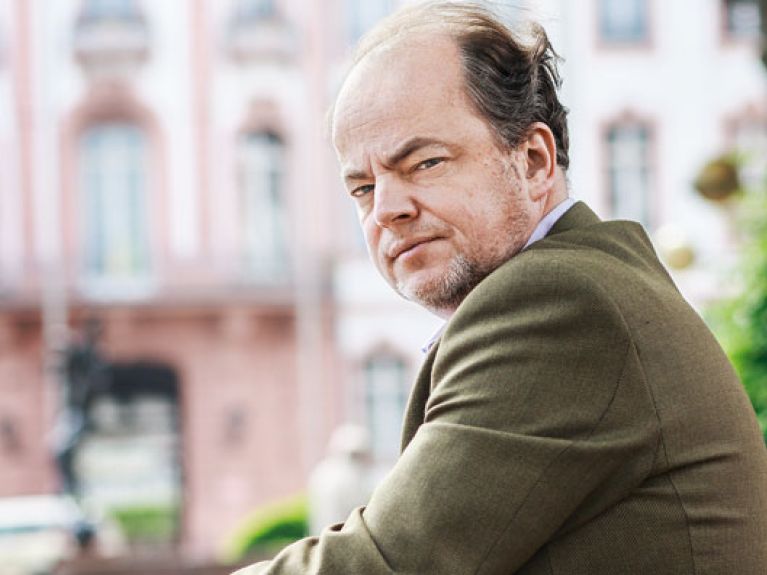“Culture can be the ‘cement’ of a society”
Thibaut de Champris, Director of the Institut français in Mainz, attributes culture with a healing role.

Mr. de Champris, is Europe facing not only a financial crisis, but also a crisis of cultural identity? Shouldn’t the time have now come for culture, the time for a big idea?
Europe is apprehensive, but that’s not entirely new. It’s a profound apprehension that affects the core of culture, namely the ritual. Hectic activity and the dominance of fashions and trends are the result. Culture can play a healing role if it contributes to deceleration, inspires curiosity and wonder, and resharpens the sensitivity for form.
What is actually the unifying element in European culture – if we leave aside the historical lines of communication for once?
If we no longer know or no longer want to know the foundations, we will spend a long time searching for what unites us and will not find it. There is no today without a yesterday, without looking back or reassurance. Theodor Heuss, the first Federal President of “post-Prussian” Germany at a time when it was still finding its identity, once said that Europe is built on the Acropolis, the Capitol and Golgotha. Are we conscious of that today?
High unemployment and a lack of prospects. What can culture achieve in a climate like this?
Culture can be the “cement” of a society and provide formative foundations if it seeks dialogue with people – also with the supposedly uneducated – and other disciplines, ranging from theologists and architects to historians and economists. Dialogue that is unprejudiced, humble and seeking the essential.
Héctor Abad, the Colombian writer, is afraid Europe has lost the enthusiasm of its early years. He believes that this contains the danger of populists leading the EU back to nationalistic nightmares. Is that a typical view “from outside”?
No, Europe has not always only inspired enthusiasm, and even today it is not only seen negatively. Actually, all Europeans want Europe – even today. However, a balance must be kept between up and down. People want political decision-making levels that are close to them. The EU can not replace these levels without triggering defensive reflexes. Subsidiarity is therefore required. The EU’s role is the peacekeeper and untiring seeker of consensus as well as the defender of European interests. When it is that, it is very well accepted and wanted.
Do you have a concept of Europe as a cultural centre of yearning?
For me Europe is the yearning for a hilly landscape where an established balance between rusticity and urban density is cultivated, where consideration is given to people and nature, where the right proportions ensure there is no place for self-indulgence. This Europe is perhaps already arising in the slowfood movement and in citizens’ protests against the desecration of the landscape and cities.
How do you perceive the mood in your native country? And how are you responding to this in your programming in Germany?
I do not see my home separately from the country and place where I work and live. That is Europe as I live it. Our programme is interdisciplinary and intertemporal – in other words, not only focused on a supposed or real given reality. That is culture as I understand it. That is the only way we will find answers to the questions of our time.
Franco-German friendship will be celebrating its 50th birthday this year. Have all the neighbours’ secrets now been revealed?
Thank God there is still a lot left to discover – about ourselves and the others. The connection will not just remain exciting, but become even more so. That’s because we really do not yet know as much about the other country as we sometimes think.
THIBAUT DE CHAMPRIS is Director of the Institut français in Mainz. The political scientist and international law specialist gained experience in the diplomatic service and is an acknowledged expert on Germany. www.institutfrancais.de

